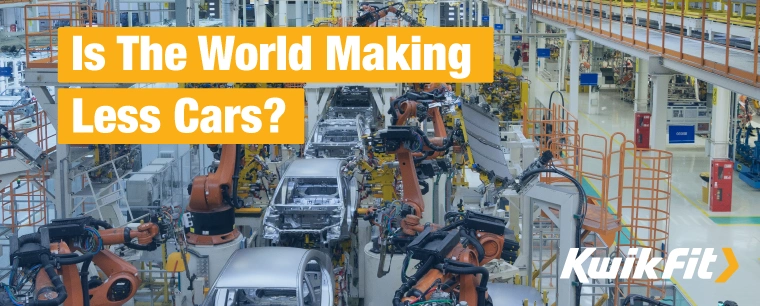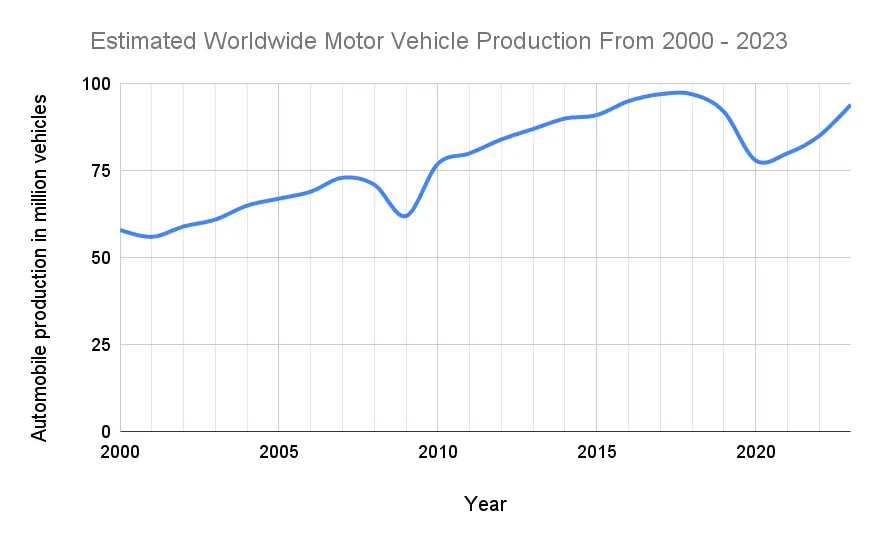Is The World Making Less Cars?
Jack Dreyer | Thursday 11th April 2024 12:00pm

In 2023, global motor vehicle production rose to 94 million units, a 10.5% rise from the previous year.
But, pre-pandemic levels were higher than this, with production peaking in 2017 and 2018 at 97 million units each year. Will global car production return to pre-pandemic levels or have global events, trends, and behaviours changed the vehicle production scene for good?
While we’re the experts when it comes to vehicle repair and maintenance, we don’t often talk about their production. So, in this blog, we’ll be temporarily hanging up our overalls and taking a closer look at the manufacturing of brand-new cars.
Read on as we investigate the recent trends in the global car production market and assess the potential reasons behind the peaks and troughs we find.
Car production in recent history
Ok, history buffs, we’re travelling back in time (albeit only to 2000), to find out just how many vehicles, and at what rate, were actually produced.
Booms (and recessions)
In the year 2000, there were just 58 million vehicles produced worldwide — 62% lower than the number of new vehicles produced today. To put this into perspective, there were 6.2 billion people on Earth that year.
Over the next 7 years, car production rates increased at a steady rate until 2007 when they peaked at a respectable 73 million. At this point, the most popular cars in the world included the Ford F-Series, the Toyota Camry, and the Chevrolet Silverado.
However, as the recession began to hit towards the end of 2007, new car production, closely in line with new car sales, began to fall. Dubbed the greatest economic downturn since The Great Depression, even the most advanced economies (like the UK, USA, and Germany) did not recover to their pre-recession levels until at least 2010 — and the car production trends mirror this.
From 2010 onwards, global car production rates boomed again until they peaked at 97 million units in 2017-18. To date, this figure has not been matched.

COVID-19 & new car production
A glaringly obvious anomaly on almost every graph comparing year-on-year trends, 2020 sticks out like a sore thumb. Owing to the halting of industrial production and manufacturing action caused by the pandemic, 2020 saw global car production fall to 78 million units — almost the same as in 2010.
It is important to note the beginnings of a downfall in production in 2019; this was when the pandemic first began to outbreak in China, one of the core manufacturers of vehicles globally. Let’s take a quick look at the key impacts of the pandemic on motor production before moving on to discuss car manufacture today:
- The initial outbreak of the pandemic caused supply chain disruptions — beginning in China and spreading further afield.
- As countries began to serially enforce national lockdowns, there was a sudden decrease in personal mobility meaning that A) fewer people were using their cars and B) car manufacturing plants were without workers.
- Car sales online grew slightly, particularly in the second-hand sector. However, this was not enough to offset the overall decline in sales.
Global car production since the pandemic
Since the low levels in 2020, global car production rates have recovered and grown year-on-year, just as they did after the 2008 recession. The latest figures reveal that, in 2023, there were 94 million cars produced globally.
As expected, since the pandemic, China, Japan, and Germany have been among the largest producers of cars and commercial vehicles. China, especially, has been responsible for a third of global car production alone (26 million units), with its largest car manufacturing company being Shanghai General Motors Company Ltd which produces and sells passenger vehicles under the Chevrolet and Cadillac brands.
The following chart plots the two distinctive troughs (and successive growth) of worldwide automobile production in 2009 and 2020, respectively.

Data source: Statista. Published by Published by Martin Placek, Mar 25, 2024
Looking at the chart in isolation, we may expect 2024’s figure to fall in line with 2014’s, a step towards growth and recovery after a significant decline. But, how confidently can we predict this?

Can we predict global car production?
While the rate of growth following the pandemic is promising, will the peak of 2017-18 be reached again? Or, will long-term changes in consumer behaviour and motoring trends cap this growth before it reaches 97 million? A few factors are to be considered here.
Manufacturers are, to a certain extent, governed by demand. And, if that demand falls, so too must production. There are a number of factors that may contribute to a lesser demand for cars (which we’ll explore below). However, whether any are significant enough to impact the natural growth of production is impossible to say without the privilege of hindsight.
Government initiatives
In many countries, governments are bound to environmental targets to reduce their CO2 output. This has significant implications for cars — particularly in cities. Using the ULEZ in London as an example, the government has been promoting public transport over cars to reduce emissions.
However, on the other hand, electric and hybrid vehicles are more in demand than ever as they are often subsidised by governments and made expect from certain taxes related to emissions.
Perhaps, then, it is less a question of whether less or more cars are being produced and instead what type of vehicle.
Consumer trends
Since the pandemic, there has been a renewed focus on all things ‘local’. Since travel was restricted, people began shopping more locally and driving less far afield. This is reflected in the recent lull in people (young adults especially) driving. However, is this just the result of a delay after the pandemic?
What about the UK in isolation? Interestingly, in 2022, vehicle production in the UK fell to its lowest level in 66 years.
According to the Society of Motor Manufacturers and Traders, 2023 saw the worst performance since 1956 as fewer and fewer new cars are being produced in the UK. In total, the UK produced 775,014 cars in 2022 — down from 1.3 million before the pandemic. According to recent research, production has fallen every year since 2016.
So, is the world making fewer cars?
Technically, in 2023 the number of cars produced was less than it has been in recent years, with global vehicle production being higher in 2017 and 2018 than in 2023.
However, such a broad question does not allow for natural variation at a national level. What’s more, as we’ve learnt today, due to the rapid rise in popularity of hybrid and electric vehicles, it is equally as important to consider what type of cars are being produced as it is to contemplate their number. So, with a shrug, we eagerly anticipate the figures for 2024 to be released.
If you’re not planning on purchasing one of the 94 million new cars manufactured last year, and you’re keen to keep your car on the road for another year, make sure it’s in good working order with Kwik Fit. A combination of regular servicing, free vehicle health and safety checks, and tyre care should see to that.
In the meantime, keep up to date with the latest motoring advice and trends on the Kwik Fit blog.
Any facts, figures and prices shown in our blog articles are correct at time of publication.
Featured Articles
Is it Illegal to Drive With One Headlight?
Saturday 19th July 2025
Wondering if it’s illegal to drive with one headlight? Learn about the safety risks and penalties of illegal blown bulbs and why you should fix them promptly.
Air Con in EVs & Hybrids: Experts Answer Your Questions
Monday 30th June 2025
Does air con drain EV batteries? Can you use the air con while charging an electric car? Find out the answers to these questions & more from Kwik Fit’s experts.
Why Is Your Car Making a Noise? Fixes & Tips
Friday 13th June 2025
When your car starts making unexpected noises, it can certainly be quite disconcerting; it may be nothing to worry about, but here’s what you need to know.









